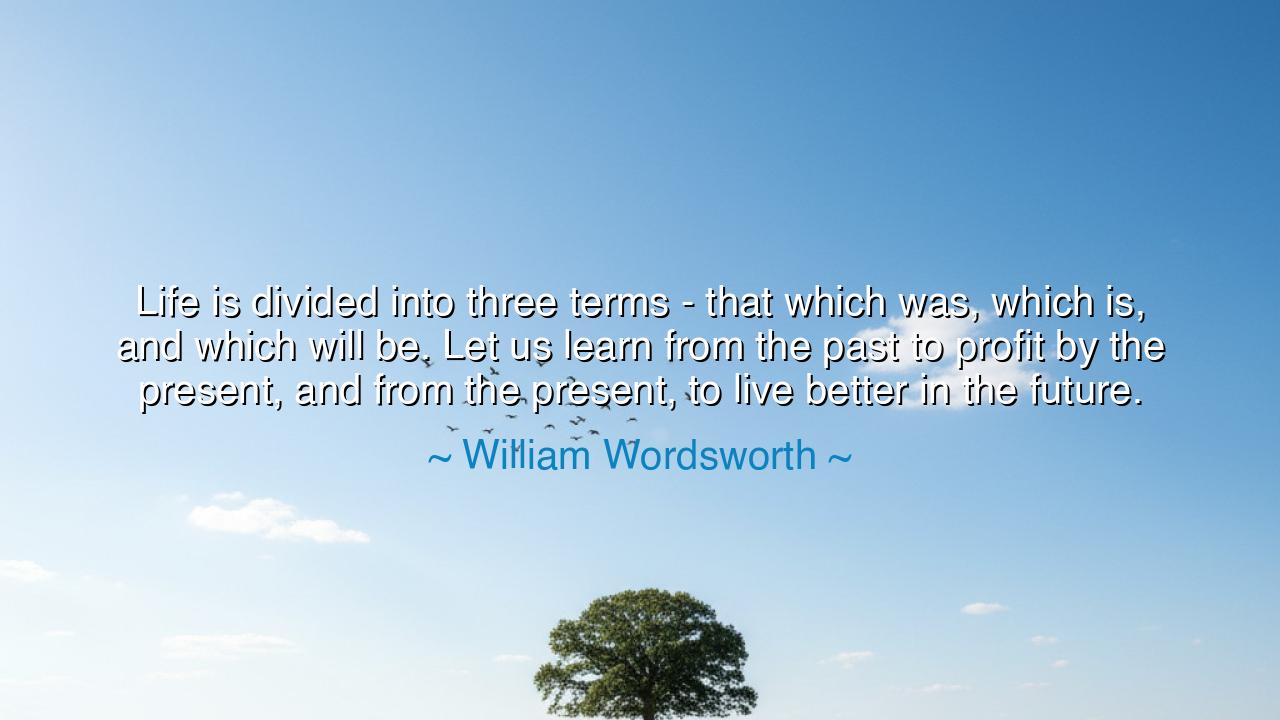
Life is divided into three terms - that which was, which is, and
Life is divided into three terms - that which was, which is, and which will be. Let us learn from the past to profit by the present, and from the present, to live better in the future.






William Wordsworth, the great poet of nature, speaks with profound wisdom when he says, "Life is divided into three terms - that which was, which is, and which will be. Let us learn from the past to profit by the present, and from the present, to live better in the future." These words echo with the timeless truth that life is not merely a series of disconnected moments, but a continuum—each part of it intertwining, shaping the next. Wordsworth emphasizes the importance of learning from the past, living fully in the present, and using that wisdom to build a better future. The past teaches us lessons, the present is where we act, and the future is shaped by the decisions we make today.
The ancients, too, recognized the significance of time and the wisdom that can be gleaned from the passing of years. Heraclitus, the philosopher, famously said, "You cannot step into the same river twice," highlighting the constant flow of life and time. But while the river of life flows forward, it is not without significance. Heraclitus believed that understanding the past and the present was crucial to navigating the future. Just as the river carries with it the memories of every droplet that passed, so too must we carry the lessons of the past as we navigate the currents of the present and move toward the future. Wordsworth’s quote resonates deeply with this ancient wisdom: to move forward, we must first understand where we came from and make choices rooted in that wisdom.
Socrates, the ancient Greek philosopher, echoed a similar sentiment. He famously stated that "the unexamined life is not worth living." Socrates believed that we must reflect on our past actions, evaluate the present, and question the future in order to live a life of purpose and virtue. This emphasis on self-reflection mirrors Wordsworth's view that we must learn from the past to profit from the present. Socrates did not merely teach that the past was to be looked back upon in nostalgia or regret, but that it should be actively engaged with, to inform and guide our actions in the now. By learning from the past, Socrates believed, we could shape a better future—one rooted in wisdom and moral clarity.
A modern example of this concept in practice can be seen in the life of Nelson Mandela, whose journey from prisoner to president was deeply shaped by his understanding of both his past and present. Mandela spent 27 years in prison, a portion of his life marked by suffering and reflection. Upon his release, he did not cling to the anger and resentment of his past. Instead, he sought reconciliation and forgiveness, understanding that to shape a better future for South Africa, he needed to learn from the injustices of the past without being shackled by them. Mandela's ability to move from a painful past to a hopeful present shows how understanding the lessons of the past can equip us to profit from the present and build a future that reflects justice, unity, and healing.
Wordsworth’s wisdom encourages us to not only acknowledge the past but to use it as a tool for growth. The past is not to be buried in sorrow or regret, but to be reflected upon so that we may avoid repeating mistakes and embrace what is truly valuable. In the same way, the present must be lived with awareness and intentionality—for the future is shaped by the actions we take today. Wordsworth’s focus on the future is not a call to mere hope or passive dreaming, but to active engagement in shaping a future that is better than what came before it.
The true lesson from Wordsworth's insight is that we must always be aware of the interconnectedness of time. The past is a storehouse of wisdom, the present a moment of action, and the future a realm that we must actively shape through our decisions. The past gives us perspective, the present gives us action, and the future gives us hope. But to truly benefit from these gifts, we must engage with them consciously and with purpose.
Therefore, in our own lives, let us practice the art of reflection. Let us take time to reflect on our past actions and learn from them, to act in the present with the wisdom that comes from experience, and to build a future that reflects the ideals we cherish. Just as Socrates emphasized self-examination, and Mandela embodied reconciliation, we too must integrate the lessons of our history into the way we live today. In doing so, we not only shape our own lives but contribute to the shaping of a better world for future generations.






AAdministratorAdministrator
Welcome, honored guests. Please leave a comment, we will respond soon